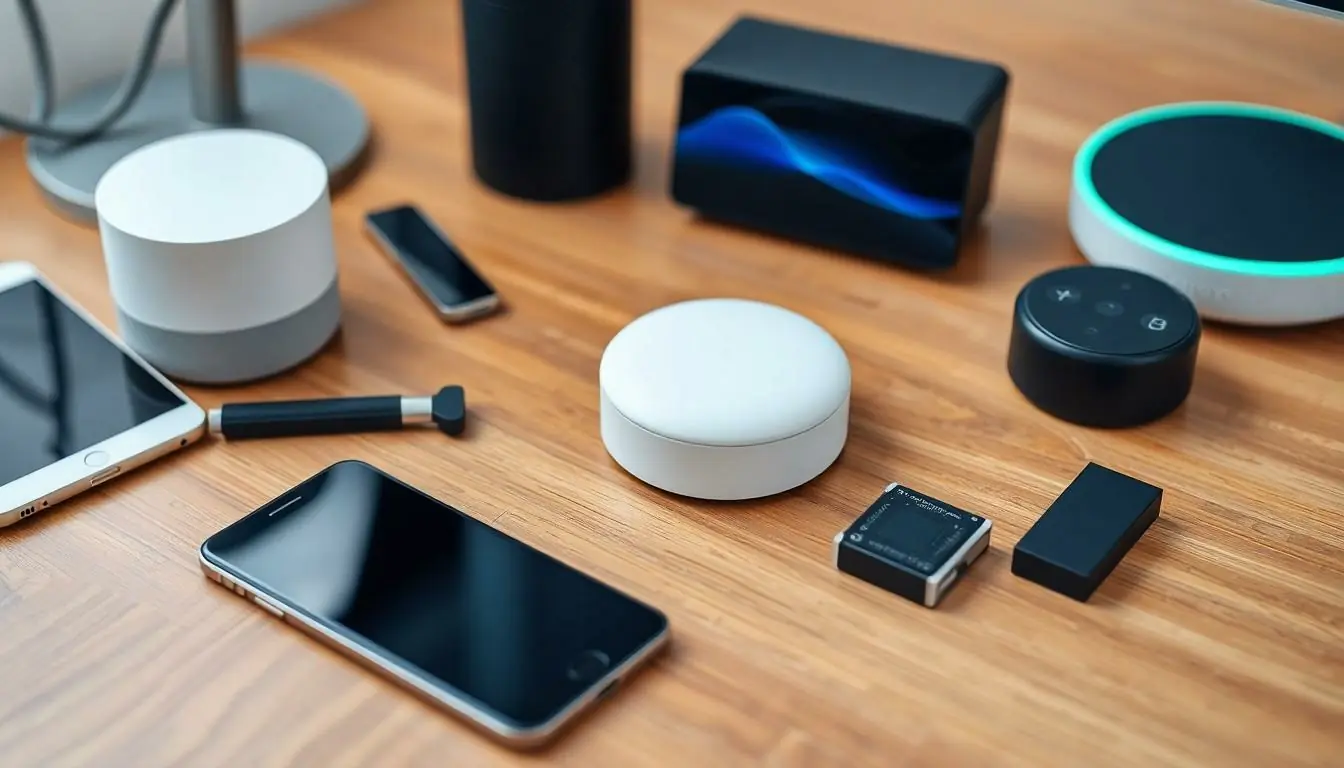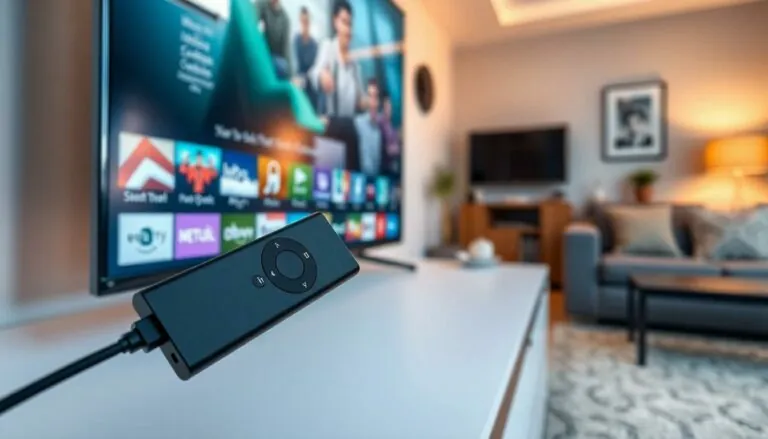In a world where gadgets outnumber humans, navigating the consumer electronics landscape can feel like trying to find a Wi-Fi signal in the middle of a desert. With technology evolving faster than a toddler on a sugar rush, it’s crucial to have a reliable consumer electronics solution that keeps pace. Whether it’s the latest smartphone or a smart fridge that orders groceries for you, understanding these solutions can make life a whole lot easier—and maybe even a bit more fun.
Imagine having the power to streamline your tech experience, turning your home into a futuristic haven without breaking the bank. From smart home systems to personalized tech support, there’s a solution out there that fits like a glove. Dive into the world of consumer electronics solutions and discover how they can transform your daily life, making it smarter, simpler, and just a tad more entertaining.
Table of Contents
ToggleOverview of Consumer Electronics Solutions
Consumer electronics solutions encompass a wide range of products and services designed to enhance everyday life. Smart home systems provide integrated control over various devices, allowing users to manage lighting, security, and energy consumption efficiently. Personalized tech support ensures that consumers receive tailored advice and assistance for their electronic needs, maximizing device functionality.
These solutions often include connected devices such as smart speakers, thermostats, and home security cameras. Such connectivity enhances user convenience and promotes energy efficiency. Innovations like voice-activated assistants facilitate hands-free operation, further improving usability.
Many manufacturers offer subscription-based services alongside their electronics, which provide ongoing updates and support. This business model allows consumers to remain at the forefront of technological advancements without additional burdens. Consumer-friendly apps enable users to monitor and control devices from anywhere, adding to the overall utility of these solutions.
High-quality customer service represents a critical component of consumer electronics solutions. Companies focus on building reliable support systems to address user questions and concerns. With real-time troubleshooting, users can resolve issues quickly, ensuring their technology continues to operate smoothly.
Consumer electronics solutions significantly contribute to a smarter, more efficient lifestyle. They combine innovative technology, personalized support, and seamless connectivity, making daily tasks easier and more enjoyable.
Key Components of Consumer Electronics Solutions

Consumer electronics solutions rely on critical components that enhance user experience and connectivity. Understanding these elements helps consumers make informed choices.
Hardware Elements
Hardware forms the backbone of consumer electronics solutions. Devices like smartphones, tablets, and smart home gadgets represent essential hardware. Additionally, components such as processors, sensors, and displays contribute directly to performance. The efficiency of batteries impacts device longevity, ensuring users enjoy uninterrupted service. Manufacturers emphasize compatibility with various ecosystems to enhance functionality. Quality in the construction of these elements ensures durability and reliability, allowing consumers to invest in products that stand the test of time.
Software Integration
Software integration plays a vital role in the operation of consumer electronics solutions. Operating systems, applications, and firmware updates enhance functionality and user experience. Efficient software allows devices to communicate seamlessly, improving the overall system performance. Moreover, intuitive interfaces ensure ease of use, enabling users to navigate features quickly. Regular updates from developers address security vulnerabilities, reinforcing user confidence. Ultimately, software serves as the bridge that connects hardware with user needs, making it indispensable in the consumer electronics landscape.
Benefits of Implementing Consumer Electronics Solutions
Implementing consumer electronics solutions offers numerous advantages that can significantly enhance daily life.
Enhanced User Experience
Enhanced user experience remains a primary benefit. Streamlined interfaces improve interaction, making devices easy to navigate. Smart home features enable coordination among devices, fostering improved accessibility. Real-time feedback from devices ensures users receive immediate responses to commands. Personalized tech support addresses unique user concerns, resulting in tailored experiences. In addition, frequent software updates enhance functionality and security. Overall, a seamless experience translates to increased satisfaction for users, encouraging continuous engagement with technology.
Cost Efficiency
Cost efficiency also stands out among the advantages. Consumer electronics solutions often lower energy bills through smart energy management systems. Automatic device scheduling optimizes energy use, decreasing overall consumption. Additionally, subscription-based services eliminate the need for frequent hardware upgrades, spreading costs over time. Manufacturers frequently provide timely updates, ensuring devices remain functional longer. On a larger scale, investing in integrated solutions prevents the need for multiple separate products, reducing overall spending. These strategies collectively contribute to long-term savings while enhancing productivity.
Challenges in Consumer Electronics Solutions
Rapid advancements in technology present significant challenges for consumer electronics solutions. Companies must adapt quickly to these changes to meet evolving consumer expectations. Innovation cycles shorten, making it difficult for products to stay relevant. New standards for connectivity and compatibility regularly emerge, which can lead to confusion among consumers. Vendors face pressure to continuously integrate smarter features into their offerings while maintaining usability. Striking a balance between cutting-edge technology and user-friendly design becomes essential for success.
Market competition intensifies in the consumer electronics sector. Numerous brands launch similar products, complicating decisions for consumers. Companies invest heavily in marketing to differentiate themselves from rivals. Price wars emerge, forcing manufacturers to lower prices while maintaining quality. As a result, consumer loyalty may waver, with buyers tempted by alternative options. Consistently delivering innovative features and superior service remains crucial for retaining market position and driving sales. Companies that fail to innovate risk being outpaced by competitors, making differentiation a constant struggle.
Future Trends in Consumer Electronics Solutions
Rapid advancements in technology shape the future of consumer electronics solutions. Consumer demand drives innovation, making trends more important than ever.
Smart Home Integration
Smart home integration attracts significant attention as consumers seek convenience and efficiency. Devices such as smart thermostats, security cameras, and lighting systems work seamlessly together. These integrated systems enhance user experience by allowing centralized control through smartphones or voice assistants. Interoperability matters; consumers prefer products that communicate effectively within a unified ecosystem. Companies investing in robust smart home platforms capture valuable market share. Enhanced security features, energy management options, and intuitive interfaces contribute to a more connected living space.
Sustainability Considerations
Sustainability remains a pressing concern as consumers prioritize environmentally friendly products. Energy-efficient devices reduce consumption, helping to lower carbon footprints. Manufacturers focusing on recyclable materials create appealing products that align with eco-conscious consumer values. The importance of longevity in electronics grows as consumers demand durability over disposability. Companies adopting sustainable practices can enhance their brand loyalty. Certifications and eco-labels serve as critical indicators for consumers seeking greener alternatives. Engaging in responsible manufacturing practices reflects a commitment to both innovation and ecological preservation.
Navigating the complex world of consumer electronics solutions offers numerous advantages for enhancing daily life. By embracing smart technologies and personalized support, individuals can enjoy a more efficient and enjoyable experience. The integration of devices and services not only simplifies tasks but also promotes sustainability and cost savings.
As the landscape continues to evolve, staying informed about innovations and trends will empower consumers to make better choices. Companies that prioritize user experience and sustainable practices will lead the way, creating a future where technology seamlessly enriches everyday life. Adopting these solutions is more than just a trend; it’s a step toward a smarter, more connected lifestyle.





